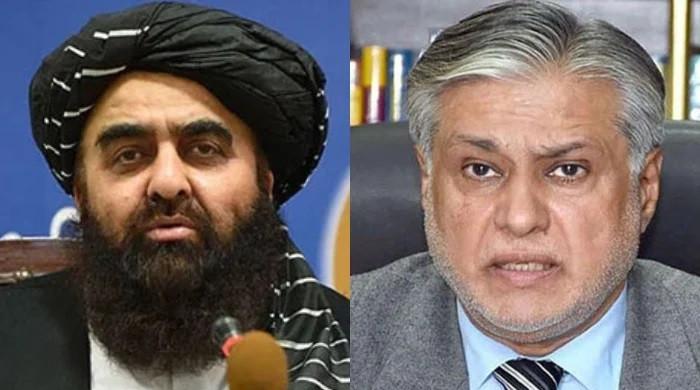- Pakistan wants only one thing: Afghan land that is not used against it.
- Says early post-2021 contacts with Taliban “cost Pakistan a lot.”
- notes that violence is increasing; hope that the negotiations on 6 November make progress.
ISLAMABAD: Deputy Prime Minister and Foreign Minister Ishaq Dar said on Tuesday that he received six calls from Afghanistan’s Acting Foreign Minister, Amir Khan Muttaqi, telling him one thing: Do not allow your land to be used against us.
“I told the Afghan minister: we want only one thing – that Afghan territory is not used against Pakistan – adding that the situation has put him in a difficult position,” DPM Dar said while speaking on the Senate floor.
On the fallout from the Taliban takeover in 2021, the DPM said Pakistani envoys told the new Afghan rulers that they had come for “a cup of tea” but that small missteps had costly consequences and such mistakes must not be repeated.
He said formal ties between the two countries were quiet for four years after the Taliban took power, but he traveled to Afghanistan to hold talks and sign agreements. His only demand, he said, was that Afghan soil not be used for attacks on Pakistan.
“The violent incidents in Afghanistan have increased since the current government took office,” Dar said, adding, “Islamabad is committed to fighting to the last breath and expressed hope that the talks scheduled for November 6 will move forward.”
On internal security, he said operations conducted up to 2018 had significantly reduced militant attacks in the country.
Separately, Dar denied claims of payments to religious scholars in Punjab, saying he was not aware of any officials giving Rs10,000 or Rs25,000 to ulema – and if true, it would be regrettable.
Last month, Pakistan and Afghanistan agreed to extend a ceasefire during talks in Istanbul after the worst border clashes between the neighbors in years, according to Turkiye, which brokered the talks along with Qatar.
The two countries faced their most serious military confrontations since the Taliban’s takeover of Kabul in 2021, with deadly clashes this month triggering Pakistani airstrikes, Afghan retaliatory fire and the closure of key crossings used for trade and transit.
Turkish officials added that a follow-up meeting would be held in Istanbul on November 6 to decide how to implement the mechanism and that Turkiye and Qatar “are ready to continue cooperation with both sides for lasting peace and stability.”
Taliban spokesman Zabihullah Mujahid issued a separate statement shortly before midnight in Istanbul confirming the end of the talks and saying both sides agreed to continue discussions in future meetings.
Tensions between Islamabad and Kabul
Pakistan has been grappling with rising terrorist incidents, especially in KP and Balochistan, since the Afghan Taliban regime took power in 2021.
The government has repeatedly called on the Taliban regime to rein in terror groups responsible for countless attacks in Pakistan.
However, the Taliban regime remained largely indifferent to Pakistan’s demands and gave sanctuary to several terrorist groups targeting security forces and civilians.
Instead of addressing Pakistan’s concerns about cross-border terrorism, the Taliban regime resorted to unprovoked firing along the border on 12 October.
Pakistan’s armed forces quickly retaliated, killing over 200 Taliban fighters and affiliated militants; however, as many as 23 Pakistani soldiers were martyred during the border clashes.
Security forces also carried out strikes inside Afghanistan, including in Kabul, destroying terrorist hideouts in the country.
Hostilities between forces of the two nations ceased after Pakistan accepted the Taliban regime’s request for a temporary ceasefire on 17 October.
Delegations from the two countries later met for talks brokered by Qatar in Doha, where they agreed on a ceasefire agreement.
Turkiye then hosted the second round of talks in Istanbul, which began on 25 October.
However, the talks ended without conclusions after four days over what Pakistani authorities described as the Taliban delegation’s “illogical” arguments, which they said were “detached from the reality on the ground”.



